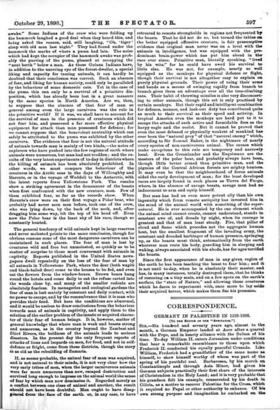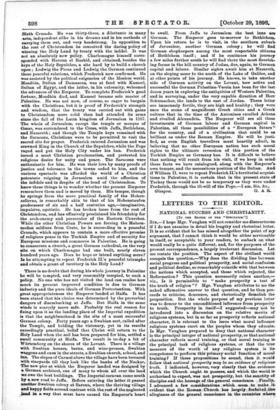CORRESPONDENCE.
GERMANY IN PALESTINE IN 1228-1898.
[To THZ EDITOZ Or THII " 81.6CIAT014.1 hundred and seventy years ago, almost to the month, a German Emperor landed at Acre after a quarrel with the Pope, and in hearty alliance with the Sultan of his time. To-day William II. enters Jerusalem under conditions that bear a remarkable resemblance to those upon which Frederick II. conducted his equally peaceful Crusade. Like William, Frederick had a grandfather of the same name as himself, to show himself worthy of whom was part of the spring of his youthful zeal. Barbarossa, by his march on Constantinople and through Asia Minor, had given his German subjects practically their first share of the interests of Christendom in the Holy Land; and it is very probable that his grandson felt his example, consecrated by his death in Cilicia, as a motive to recover Palestine for the Cross, which it required no Papal or other authority to enhance. Of his own strong purpose and imagination he embarked on the Sixth Crusade. He was thirty-three, a dilettante in many arts, independent alike in his dreams and in his methods of carrying them out, and very headstrong. In opposition to the rest of Christendom he conceived the daring policy of winning the Holy Land by treaty with the infidel. It was not an absolutely new policy. Charlemagne himself corre- sponded with Haroun el Rashid, and obtained, besides the keys of the Holy Sepulchre, a site hard by to build a church upon ; Ludwig the Pious and Ludwig the German continued these peaceful relations, which Frederick now confirmed. He was assisted by the political exigencies of the Moslem world. Moadhin, Sultan of Damascus, was at feud with Kameel, Sultan of Egypt, and the latter, in his extremity, welcomed the advances of the Emperor. To complete Frederick's good fortune, Moadhin died, and Kameel became sole master of Palestine. He was not now, of course, so eager to bargain with the Christians, but it is proof of Frederick's strength and wisdom, that the treaty was carried out with gains to Christendom more solid than had attended its arms since the fall of the Latin kingdom of Jerusalem in 1187. The whole of Jerusalem, except the temple or mosque of Omar, was surrendered to the Cross, with Jaffa, Bethlehem, and Nazareth ; and though the Temple keys remained with the Saracens, Christians were to be permitted to visit the sacred site for prayer. Frederick entered Jerusalem and was crowned King in the Church of the Sepulchre, while the Pope raged and put the Holy City under his ban. Frederick issued a most Christian proclamation, and protested his religious desire for unity and peace. The Saracens were enthusiastic for him. He won their love by many proofs of justice and tolerance in the towns ceded to him, and the curious spectacle was afforded the world of a Christian potentate reigning in Jerusalem amid the affection of the infidels and in despite of the head of Christendom. To know these things is to wonder whether the present Emperor remembers them and is moved by them. His temper, though he springs from the more practical family of the Hohen. zollerne, is remarkably akin to that of his Hohenstaufen predecessor of six and a half centuries ago,—imaginative, impulsive, egotistic. He has broken loose from the rest of Christendom, and has effusively proclaimed his friendship for the arch-enemy and persecutor of the Eastern Churches. While the other Christian Powers are forcing the Mahom- medan soldiers from Crete, he is succeeding in a peaceful Crusade, which appears to contain a more effective promise of religious peace in the Turkish Empire and of security for European missions and commerce in Palestine. He is going to consecrate a church, a great German cathedral, on the very site on which Charlemagne had one built, nearly eleven hundred years ago. Does he hope or intend anything more? Is he attempting to repeat Frederick IL's peaceful triumphs and obtain a grant of territory in the Holy Land ?
There is no doubt that during his whole journey in Palestine he will be tempted, and very reasonably tempted, to each a policy. No one who has not visited the land can realise how much its present improved condition is due to German industry and the pure ideals of German Protestantism. With great appropriateness the Emperor landed at Haifa. It has been stated that his choice was determined by the proverbial dangers of disembarking at Jaffa. But Haifa in the same winds is scarcely more safe. Probably the real reason for fixing upon it as the landing place of the Imperial expedition is that the neighbourhood is the site of a most successful German colony. Forty years ago a Swabian sect, called after the Temple, and holding the visionary, yet in its results exceedingly practical, belief that Christ will return to the Holy Land when the soil has been prepared for him, settled a small community at Haifa. The result is to-day a bit of Wfirtemberg on the shores of the Levant. There is a village with Swabian houses, barns, and wine-presses, Swabian waggons and oxen in the streets, a Swabian church, school, and inn. The slopes of Carmel above the village have been terraced with vineyards till they look like the banks of the Neckar. The new pier at which the Emperor landed was designed by a German architect, one of many to whom all over the land we owe the beat buildings. The Imperial caravan came south by a new road to Jaffa. Before entering the latter it passed another Swabian colony at Sarona, where the thriving village and happy fields around contrast with the rest of the neglected land in a way that must have caused the Emperor's heart to swell. From Jaffa to Jerusalem the best inns are German. The Emperor goes to-morrow to Bethlehem. Upon his return he is to visit, in the southern suburb, of Jerusalem, another German colony ; he will find German shopkeepers among the most respectable citizens, of Bethlehem itself ; and if he continues his journey a few miles further south he will find there the most flourish. ing farms in the hill country of Judwa, due, again, to German, capital and labour. Similar sights await him at Nazareth, on the sloping moor to the north of the Lake of Galilee, and at other points of his journey. He knows, to take another side of German activity on the Levant, how active and successful the German Palastina-Verein has been for the last dozen years in exploring the antiquities of Western Palestine, and in surveying, under the very capable direction of Herr Schumacher, the lands to the east of Jordan. These latter are immensely fertile, they are high and healthy ; they were once the scene of magnificent Greek cities and a Greek culture that in the time of the Antonines excelled Athens and rivalled Alexandria. The Emperor will see all these investments of German labour and German capital in Palestine, all these possibilities of a " European future''' for the country, and of a civilisation that could be as brilliant as under the Roman Empire. He will be justi- fied, as even English travellers must heartily admit, in believing that no other European nation has such moral rights to the ultimate reversion of this portion of the Turkish Empire as Germany has. It is difficult to believe that nothing will result from his visit, if we keep in mini these facts we have catalogued, along with the Emperor's, own temper, and the necessitous position of the Sultan. And if William II. were to repeat Frederick IL's territorial acquisi- tions in Palestine, it is certain that in the present state of Turkey these would not be so temporary as they were under Frederick, through the ill-will of the Pope.—I am, Sir, &c.,







































 Previous page
Previous page